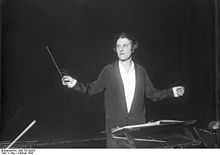Antonia Brico

Antonia Brico (June 26, 1902 – August 3, 1989) was a conductor and pianist.[1]
Brico was born in Rotterdam, Netherlands. She and her foster parents immigrated to the United States in 1908 and settled in California. On leaving high school in Oakland in 1919 she was already an accomplished pianist and had experience in conducting. At the University of California, Berkeley, Brico worked as an assistant to the director of the San Francisco Opera. Following her graduation in 1923 she studied piano under a variety of teachers, most notably under Sigismund Stojowski.
In 1927 she entered the Berlin State Academy of Music and in 1929 graduated from its master class in conducting, the first American to do so. During that period she was also a pupil of Karl Muck, conductor of the Hamburg Philharmonic Orchestra, with whom she studied for a further three years after graduation.[1] Following her debut as a professional conductor with the Berlin Philharmonic Orchestra in February 1930, Brico worked with the San Francisco Symphony and the Hamburg Philharmonic winning plaudits from critics and the public. Appearances as guest conductor of the Musicians' Symphony Orchestra in Detroit, Washington, D.C. and other sites soon followed. In 1934 she was appointed conductor of the newly founded Women's Symphony Orchestra which, in January 1939 (following the admission of men), became the Brico Symphony Orchestra.[1]
In July 1938, she was the first woman to conduct the New York Philharmonic, and in 1939 conducted the Federal Orchestra in concerts at the New York World's Fair.[2] During an extensive European tour, in which she appeared both as a pianist and a conductor, Brico was invited by Jean Sibelius to conduct the Helsinki Symphony Orchestra.[2]
Brico settled in Denver, Colorado from 1942 onwards.[1] Here she founded a Bach Society and the Women's String Ensemble.[2] She also conducted the Denver Businessmen's Orchestra, which in 1968 became the Brico Symphony Orchestra, and in 1948 became conductor of the Denver Community Symphony (later the Denver Symphony Orchestra). She was conductor of the Boulder Philharmonic Orchestra from 1958-1963.[3][4] She taught piano to such students as Judy Collins and Donald Loach.[1] Brico continued to appear as guest conductor with orchestras around the world, including the Japan Women's Symphony.[2]
A documentary film about Brico's life, entitled Antonia: A Portrait of a Woman, by director Jill Godmilow, with help from Brico's former student, Judy Collins, appeared in 1974. The film was partially responsible for invitations for Brico to conduct the Mostly Mozart Festival Orchestra in sold-out concerts recorded by Columbia Records in 1975, and the Brooklyn Philharmonia in 1977. Brico died in 1989 after a long illness at the age of 87. She had lived at the Bella Vita Towers, a nursing home in Denver since 1988.[2] History Colorado, formerly the Colorado Historical Society [HistoryColorado.org], holds a large collection of her personal papers.
References
- ↑ 1.0 1.1 1.2 1.3 1.4 Macleod, Beth Abelson (2000). Women performing music: the emergence of American women as classical instrumentalists and conductors. Jefferson, NC [u.a.]: McFarland. pp. 124–39. ISBN 0786409045.
- ↑ 2.0 2.1 2.2 2.3 2.4 "Antonia Brico". Encyclopedia Britannica. Retrieved August 29, 2013.
- ↑ Kozinn, Allan (8/5/1989). "Antonia Brico, 87, a Conductor; Fought Barriers to Women in 30's". New York Times. Check date values in:
|date=(help) - ↑ Blomster, Wes (10/5/2007). "Musical milestone: Boulder Philharmonic celebrates 50 years". Daily Camera. Check date values in:
|date=(help)
Sources
- "Women Performing Music" by Beth MacLeod, published by MacFarland and Co, 2001. ISBN 9780786409044
ISBN 0786409045
- "Women Composers, Conductors, and Musicians of the Twentieth Century", by Jane Weiner Lepage, published by Scarecrow Press, New Jersey, 1980. ISBN 9780810820821
External links
| ||||||||||||||||||||||||||||||||||||||||||||||||||||||||||||||||||||||||||||||||||||||||||||||||||||||
|